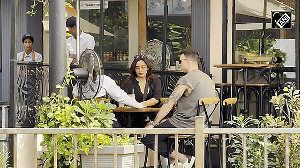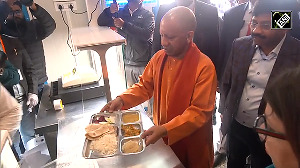'Our Constitution as well as the Right to Education Act do not make any distinction between Indian or foreigner; it only talks about 'child'.'
'It says that every child has the right to get education.'

As per media reports, around 40,000 Rohingya refugees live in various parts of India, but mainly in Delhi, Hyderabad, Jammu.
They became refugees in India when there was a military crackdown in Myanmar in 2017.
The Right to Education (RTE) Act of 2009 guarantees free and compulsory education for all children between the ages of 6 and 14 in India.
But the situation is different for the Rohingya children who live in Khajuri Khas in Delhi.
Delhi government schools are denying admission to these children because they are 'Rohingya Muslims'.
Activist and lawyer Ashok Agarwal took the case of these children to the Delhi high court.
On November 3, the high court in its order said, 'Since the Rohingyas are foreigners who have not been officially and legally granted entry into India, the present writ petition stands disposed of with a direction to the petitioner to make a representation with the Ministry of Home Affairs, Government of India which is directed to decide the same in accordance with law as expeditiously as possible.'
"Article 21 of the Constitution says that no person can be denied equality before the law or equal protection of the laws within India, and that every person, without any discrimination has the right to education in this country," Ashok Agarwal tells Rediff.com's Shobha Warrier.
How did it come to your attention that Rohingya children are denied admission in government schools in Delhi only because they are Rohingya refugees?
I got a telephone call from Sriram Colony in Khajoori Khas in north east Delhi. Around 40 Rohingya families have been living there as refugees for the last many years.
They told me that their children are not going to school as the local government schools are not giving them admission.
Then I visited the colony, and spoke to both the parents and children about their sad plight.
It was then that I decided to take the case to the Delhi high court.
This is not the first time that I have taken up an issue like this. Six, seven years ago, through our NGO, Social Jurist, I fought for the children of Pakistani Hindu refugees who were also denied admission by Delhi government schools.
At that time, I got favourable orders from the Delhi high court, and all the children were admitted in government schools in Delhi.
Why did the schools not grant admission to the Rohingya refugee children?
The only reason was they were Rohingya Muslims!
The schools said you are Rohingya Muslims and we will not take you here.
They were denied admission only because they were Muslims?
Because they are Rohingya Muslims.
Very shocking...
Yes, it is very shocking and also unconstitutional. Our Constitution as well as the Right to Education Act do not make any distinction between Indian or foreigner; it only talks about 'child'. It says that every child has the right to get education.
Article 21 of the Constitution says that no person can be denied equality before the law or equal protection of the laws within India, and that every person, without any discrimination has the right to education in this country.
And Article 21A specifically guarantees the right to free and compulsory education for children between the ages of 6 and 14, and that every child will go to school.
Right to Education Act of 2009 makes education a fundamental right for children.
Article 51 of the Constitution says it is the duty of the parents to send their children to school.
So, denying admission in government schools not only violates the rights of children but also violates the fundamental duty of the parents under the Constitution.
Did you talk to the schools regarding the rights of all children to education?
Yes..yes.. I did. The schools told me that an order should come from the top! They said, if an order came from the Director of Education, they would give admission.
The only excuse they gave me was the children were Rohingya Muslims.
After the Delhi high court order, they got the leverage to refuse further.
The high court asked you to give a representation to the home ministry.
Now we have given a representation to the MHA. We are now planning to move the Supreme Court.
Any response from the home ministry to your representation?
Nothing so far.

You visited the colony where these refugees live. Since these children cannot go to school, what do they do?
They either roam around or indulge in child labour.
These people are so poor that they cannot afford to send their children to private schools. They can only send their children to government schools.
Some reports say these children do not have valid id cards like Aadhar cards, and that was why they were denied school admission. Is it true?
No, that's not an issue at all. The only problem here is they are Rohingya Muslim refugees. They are unpopular people in this country.
These refugee children will not get admission unless a clearance comes from the ministry or the higher court.
Is this a problem for other refugees also in India. For example, you have Tamil refugees from Sri Lanka in Tamil Nadu, refugees from Bangladesh, etc..
No other refugees have this problem. I don't think any school in the country is refusing admission to a child who wants to go to school.
Even other refugees from Myanmar also got admission in Delhi schools.
Only Rohingya Muslims are facing this problem.
I don't think this kind of discrimination happens in any other country. Nowhere in the world is a child denied admission in a school. If any country does that, it will go against public interest.
You said in court that it was a 'mindset problem'. What do you mean by that?
The kind of adverse atmosphere that is created in society by saying every day that Rohingyas are living illegally in India, and that state governments are protecting them, affects the mindset.
This creates such an atmosphere that these people do not get work also.
Nobody gives them houses on rent.
They are facing so many problems.
But we are not talking about all those problems. We want to see that these children go to school, and that too to a government school.
So, what is the future course of action?
We are awaiting a response from the ministry of home affairs.
Feature Presentation: Ashish Narsale/Rediff.com











 © 2025
© 2025